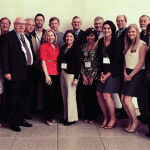“Many physicians feel very uncomfortable asking patients for money,” Dr. Arnold says. “Physicians don’t have to do that. What rheumatologists should do is ask their patients, ‘Would you be interested in hearing about this? Our foundation is doing research directly applicable to your illness.’ If the patient says yes, the connection needs to be made with the professionals who are staffing the Foundation, and they’ll take it from there.” [Editor’s note: Health professionals and patients interested in learning more about the Foundation can call (404) 633-3777 or e-mail [email protected].]
Physicians also can place informational flyers or posters in their practice settings to help start the conversation. In addition, the Foundation is always in need of volunteers for various projects, programs, or committees. Any form of involvement can help advance rheumatology research and training, and therefore help patients.
“This foundation has been very successful and will continue to be successful if the rheumatology community unites behind it,” Dr. Arnold says. “The purpose and the goals of the Foundation are perfectly aligned with what the rheumatologists want to accomplish for our patients: advancing treatment and finding cures. It couldn’t be a more specific alignment, and that is definitely worthy of our support.”
What’s in Store
The Rheumatology Research Foundation will continue to play an important role in shaping the future of rheumatology. Not only will the research initiatives assist in improving treatment for patients, but by supporting budding rheumatologists and investigators, the Foundation can help bolster the rheumatology workforce of the future and fill training programs with academic rheumatologists.
“We really feel that we’re in this for the long term,” Dr. Daikh says. “For the future, we hope to continue to grow to be able to support the priorities of rheumatologists as members of the ACR and to meet the needs of the greater public from the standpoint of rheumatic disease. We hope that with a clearly defined brand and new name, we will become more recognized and more understandable to more and more people.”
Kimberly J. Retzlaff is a medical journalist based in Denver.


